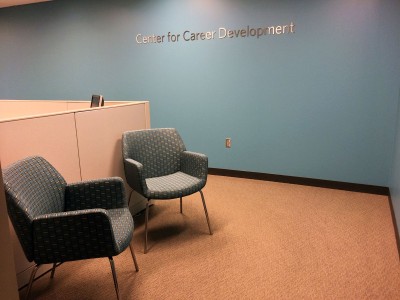
A study released Tuesday by the Association of American Colleges and Universities found a dichotomy between the way employers and students feel about workforce preparedness, with students often feeling more confident about their skills than their employers.
The study, titled “Falling Short? College Learning and Career Success,” sampled 400 employers and found that they want to see college graduates with both field-specific and broad knowledge and applied skills to achieve long-term success in today’s economy.
“Colleges’ and universities’ goal is to produce students who are ready and prepared for the working world, so it is the colleges’ and universities’ responsibility to make sure students do graduate with those skills and are ready to be competitive in this global economy,” said Carrie Johnson, a spokeswoman for the AACU. “[It is] also the responsibility of the students to know what employers are looking for.”
For entry-level positions, 74 percent of college graduate students think they are doing a good job, compared to 42 percent of employers who said the same of their students, according to the study. When up for consideration for a promotion, 64 percent of college graduates said they were doing a good job versus 36 percent of employers.
Eighty-five percent of the employers in the study said effective communication, decision-making, teamwork and critical thinking are key skills they look for in prospective employers, the study stated.
“Students need specific knowledge and a broad range of knowledge and skills that cut across their majors. The greatest value is those demonstrated in the persistency of field knowledge a student accumulates over the entire undergraduate experience,” she said. “Many current employers have said that they really value undergraduate liberal education, and it goes beyond your major such as writing skills and the ability to think critically.”
About 58 percent of the employers said educational institutions should make improvements to better prepare students for the working world, the study stated.
“They can make improvements by modifying their curriculum [such as] offering more practices like internships as a part of their core courses and support students through career centers and mentorship opportunities,” Johnson said.
Kelly Ford, associate director at Boston University’s College of Communication Career Services, said disparity about employment preparedness can stem from students thinking just a college degree is enough to succeed.
“The students think that a college degree will suffice. If they’re just looking at entry-level position for mid-level positions then of course they’re going find it hard to succeed,” she said. “Of course, the most important thing is communication. If you can’t communicate with clients your ideas and your goals, of course you’re not going to be successful.”
COM Career Services has worked with alumni and employers to determine what skills are needed in the industry and figure out how to help students gain those skills, Ford said.
“We have employers come back repeatedly, so it sounds strange if they seem unsatisfied with our students,” she said. “I don’t necessarily think that schools are at the mercy of employers. You go to school to be taught something and how employers are looking for specific skills.”
V. Scott Solberg, associate dean for research and a professor in the School of Education, said if students are goal-oriented and focus on their future careers, entering the workforce should be an easier step.
“What we’ve been doing is to get students to think specifically about the kinds of roles they are going to play in school and create a comprehensive plan for how they are going to go about that role,” he said. “We need students that are more self-objective oriented, culturally trained and have the leadership skill and we’re starting to find that.”
Sam Kelley, a COM freshman, said she is hopeful that the skills and resources at BU will help prepare her for a job.
“If I were to use BU’s resources, I’d be somewhat prepared for a job,” she said. “I notice that we have [events] such as job fairs, and we have distinguished alumni that would eventually help us.”
Alexandria Gale, a freshman in the College of Arts and Sciences, said students are often told their degree will get them a job after graduation.
“There’s this new shift that college degrees don’t automatically guarantee you a job. Now more people have degrees, so they’re seen as less valuable,” she said. “So college students aren’t understanding this because they’re being brought up by people who still fall under the old belief.”
Janae Stewart, a junior in the School of Management, said the different schools at BU emphasize different skills that work best in those fields, but students often don’t take full advantage of the information they can learn.
“With the courses I’m taking, a lot of the knowledge is applicable to the real world and what I’d probably be doing with my career,” she said. “But at school, there’s such a stress on grades that some people don’t really retain what they’re learning.”




















































































































